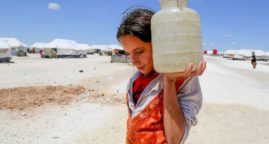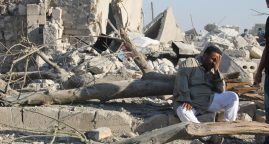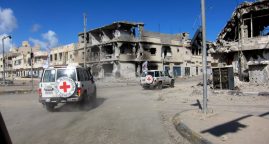International humanitarian law: answers to your questions
This booklet is an ideal introduction to international humanitarian law.
It has been fully revised, and is accessible to all readers interested in the origins, development and modern-day application of humanitarian law.
The original Geneva Convention “for the amelioration of the condition of the wounded in armies in the field” was adopted in 1864, and marked the beginning of modern international humanitarian law (IHL). It was followed by many other treaties, all of which seek to embody this basic principle: war must be waged within certain limits that must be respected, in order to preserve the lives and the dignity of human beings. The nature of warfare has changed unrecognizably since the adoption of the original Geneva Convention 150 years ago. Most contemporary armed conflicts now take place within States, rather than between States. The means and methods of warfare have become sophisticated to a degree scarcely conceivable by our forebears, the use of unmanned weapons such as drones being a good example. It is reasonable to ask: Has IHL kept up with all these changes? Our answer is that it has. The core principles of IHL remain as relevant asever, and IHL has indeed evolved in response to developments in armed conflict, and continues to do so. The ICRC has been actively involved for the last 150 years in strengthening IHL and keeping it up to date.Peter Maurer, President, International Committee of the Red Cross.
21 questions to answer all questions on international humanitarian law are answered in this booklet.
Related Articles
OCHA report : 2017 Humanitarian Response Plan End of Year Report (January – December 2017)
December 2017. Humanitarian needs remain staggering in terms of scale, severity and complexity.
Aleppo: ICRC calls to stop violence
04/29/2016. “There is no safe place anymore in Aleppo. Even in hospitals,” Marianne Gasser, head of the ICRC in Syria.
David Horobin: “In today’s world a major crisis cannot be handled by one individual.”
10/05/2017. Recently appointed head of the GCSP Crisis Management Cluster, David Horobin has a lifetime of experience on the frontlines of complex emergencies.






